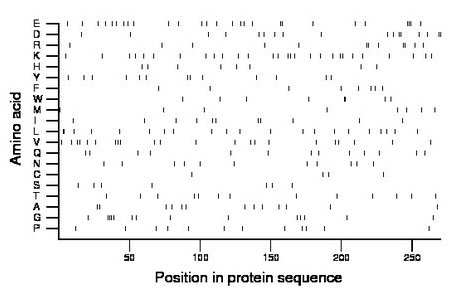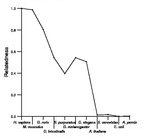
| Name: PITPNA | Sequence: fasta or formatted (270aa) | NCBI GI: 5453908 | |
|
Description: phosphatidylinositol transfer protein, alpha
|
Referenced in:
| ||
|
Composition:

Amino acid Percentage Count Longest homopolymer A alanine 4.8 13 1 C cysteine 1.5 4 1 D aspartate 6.3 17 2 E glutamate 10.0 27 3 F phenylalanine 3.0 8 1 G glycine 5.2 14 3 H histidine 3.0 8 1 I isoleucine 4.1 11 1 K lysine 10.4 28 1 L leucine 7.8 21 2 M methionine 3.0 8 1 N asparagine 4.1 11 1 P proline 4.4 12 1 Q glutamine 4.8 13 1 R arginine 4.4 12 2 S serine 2.6 7 1 T threonine 4.8 13 1 V valine 8.1 22 1 W tryptophan 3.0 8 2 Y tyrosine 4.8 13 1 |
Comparative genomics:
Search single species RefSeq proteins at NCBI
Search summary 
Figure data | ||
Related human proteins:Protein Relative score Description Self-match 1.000 phosphatidylinositol transfer protein, alpha PITPNB 0.810 phosphatidylinositol transfer protein, beta PITPNM1 0.392 phosphatidylinositol transfer protein, membrane-ass... PITPNM1 0.392 phosphatidylinositol transfer protein, membrane-ass... PITPNM2 0.376 phosphatidylinositol transfer protein, membrane-asso... PITPNC1 0.330 phosphatidylinositol transfer protein, cytoplasmic 1... PITPNC1 0.328 phosphatidylinositol transfer protein, cytoplasmic 1... SLC16A9 0.009 solute carrier family 16 (monocarboxylic acid transp... MAP4K4 0.007 mitogen-activated protein kinase kinase kinase kinas... MAP4K4 0.007 mitogen-activated protein kinase kinase kinase kinas... MAP4K4 0.007 mitogen-activated protein kinase kinase kinase kinas... TFAM 0.006 transcription factor A, mitochondrial AKAP9 0.006 A-kinase anchor protein 9 isoform 2 AKAP9 0.006 A-kinase anchor protein 9 isoform 3 C21orf91 0.006 early undifferentiated retina and lens isoform 3 [H... C21orf91 0.006 early undifferentiated retina and lens isoform 1 [H... C21orf91 0.006 early undifferentiated retina and lens isoform 2 [H... DNAH2 0.006 dynein heavy chain domain 3 CHRNA6 0.006 cholinergic receptor, nicotinic, alpha 6 ITSN1 0.006 intersectin 1 isoform ITSN-s ITSN1 0.006 intersectin 1 isoform ITSN-lHuman BLASTP results (used to prepare the table) | |||
Gene descriptions are from NCBI RefSeq. Search results were obtained with NCBI BLAST and RefSeq entries. When identical proteins are present, the self-match may not be listed first in BLASTP output. In such cases, the table above has been reordered to place it first.
See About the Figures for the scoring system used in the figure above right. The same scoring system was used in the table of BLASTP results.
Guide to the Human Genome
Copyright © 2010 by Stewart Scherer. All rights reserved.
